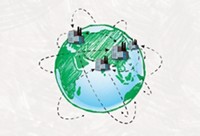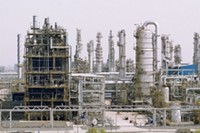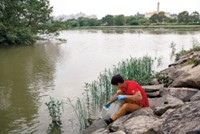Advertisement
Grab your lab coat. Let's get started
Welcome!
Welcome!
Create an account below to get 6 C&EN articles per month, receive newsletters and more - all free.
It seems this is your first time logging in online. Please enter the following information to continue.
As an ACS member you automatically get access to this site. All we need is few more details to create your reading experience.
Not you? Sign in with a different account.
Not you? Sign in with a different account.
ERROR 1
ERROR 1
ERROR 2
ERROR 2
ERROR 2
ERROR 2
ERROR 2
Password and Confirm password must match.
If you have an ACS member number, please enter it here so we can link this account to your membership. (optional)
ERROR 2
ACS values your privacy. By submitting your information, you are gaining access to C&EN and subscribing to our weekly newsletter. We use the information you provide to make your reading experience better, and we will never sell your data to third party members.
Business
The Big Move East
Message from SOCMA conference is that China and India are here to stay
by MICHAEL MCCOY, C&EN NORTHEAST NEWS BUREAU
September 27, 2004
| A version of this story appeared in
Volume 82, Issue 39
In 2000, executives with the british specialty chemical maker James Robinson Ltd. knew they wanted to construct a plant for a chemical used in color film developing. What they needed to decide was whether to build at one of their existing sites in the U.K. and Germany or at a new location in another region.
As Brendan Catlow, the firm's managing director, told the Synthetic Organic Chemical Manufacturers Association's annual corporate excellence conference earlier this month, it became obvious after making cost projections that "to survive in the long term, we needed a low-cost alternative to Europe."
Nine months after choosing India, James Robinson was operating a new plant that cost $1.5 million to build. According to Catlow, the same facility would have cost $15.7 million in Germany--and nine months is what it would have taken just to receive the necessary permits.
Catlow was one of several speakers at the conference, held in Cambridge, Md., who made it clear that low-cost countries such as India are a big part of the future for Western manufacturers of fine and custom chemicals. Rather than competition, though, many firms see low-cost regions as necessary partners.
For James Robinson, Catlow said, the Indian advantage doesn't stop at construction costs. The firm pays chemists less than $300 a month in India, versus $3,600 in the U.K. And the quality of chemistry in India is high, he said. "In the U.K., it's not trendy to go to university and study science or engineering. The reverse is true in India."
In 2001, Reilly Industries opened a pyridine plant in China. According to Jacqueline A. Simmons, the firm's vice president and general manager for pyridine chemicals, Reilly chose China not for cost but for market reasons: The largest use of pyridine is the herbicide paraquat. Reilly's largest customer, Syngenta, was building a paraquat plant there and wanted a local raw material supply.
Reilly put up the pyridine plant, in Nantong near Shanghai, for about $30 million, which is only modestly less than it would have cost on the U.S. Gulf Coast. Variable costs--mainly raw materials--are about the same as in the West, she said. Environmental costs are actually higher because Reilly incinerates its wastewater in Nantong. Labor costs are much lower, although Simmons said they are rising at about 10% annually.
Both Catlow and Simmons told attendees that picking the right local partner was crucial to the success of their projects. Even so, cultural differences often proved to be stumbling blocks.
James Robinson's choice of India's Chemiesynth Group was the culmination of a relationship that started in 1988 as a simple raw materials purchasing agreement. A contract manufacturing deal for a hair-dye intermediate, signed in 1994, was a second step toward the full-fledged partnership that was signed in 2000.
Catlow maintained that two oft-cited drawbacks of India--low quality and environmental standards--are actually myths. The Vapi industrial estate where the developer plant was built houses its own nonprofit water treatment complex that was "set up by the chemical industry for the chemical industry." On the subject of quality, he noted that James Robinson's recent switch from a U.S. to an Indian supplier of fluorescent dye intermediates yielded a better quality product at half the price.
A brinksmanship style of negotiation is common in both India and China, according to the speakers. Simmons cautioned attendees never to reveal when they must depart for a flight because Chinese executives will always wait until then to raise the most thorny issues. And Catlow said corruption among government officials is a fact of life in India that only a local partner can help negotiate.
Daniel Joseph, managing director for international operations at ESS China, a firm that specializes in helping U.S. companies navigate China, told the conference that many companies that have spent the past 20 years trying to get close to their business partners erroneously perceive China as a place to which they can send a fax with a price and a delivery date. Such firms, he said, are finding that their China commitment is costing more time and money than they first expected.
ALTHOUGH LANGUAGE is a barrier in China, Joseph cautioned against relying too heavily on a single English-speaking "gatekeeper" for doing business there. "There are a lot of companies whose number one competitor is the guy they first hired three years ago," he said.
Friedman cited a number of pieces of evidence: capital allocation based on political rather than economic considerations, an investment system based on debt rather than equity, rigged accounting at companies and in the government, undercapitalized banks, and a hollowed-out financial system. "Don't confuse the size of the Chinese economy with the health of the Chinese economy," he said.
Such a dire view of China's future does not seem to be dissuading chemical companies from investing there. Simmons said Reilly's Nantong plant is profitable and expanding. By the middle of 2005, it will be 30% larger, and by the end of 2006 it will be twice the size it is today. "We as a company have never made a better decision," she said of Reilly's move to China.
MORE ON THIS STORY
THE BIG MOVE EAST
Message from SOCMA conference is that China, India are here to stay
Business Looks Better This Year
Business Looks Better This Year










Join the conversation
Contact the reporter
Submit a Letter to the Editor for publication
Engage with us on Twitter